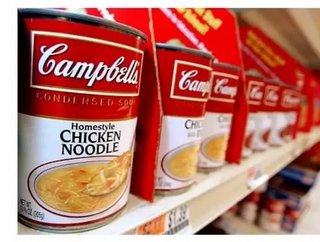Campbell Soup cuts jobs, eyes supply chain improvement

Those of you who think that adding jobs in the U.S. will stimulate the economy best look away now.
Campbell Soup is starting up a new supply chain management initiative aimed at recovery and economic stimulation, but will be cutting 700 jobs around the world as part of the supply chain overhaul.
At a biscuit plant in Australia, a new automated supply chain management system will cost $40 million over the next year-and-a-half to integrate and will come at the expense of 190 jobs.
Other job cuts will come at Campbell Soup’s Camden, New Jersey headquarters and in Michigan. The company will also be leaving the Russian market after just four years of action there.
Despite the cuts, Campbell Soup views the change as a positive move for the company.
“The supply chain initiatives will enable us to improve manufacturing efficiency and further adjust the utilization of our assets to evolving consumer demand,” Denise Morrison, Campbell’s current COO and incoming CEO, said. “While a workforce reduction is always a very difficult decision, these actions will streamline our organization and improve the level of coverage and the effectiveness of our sales merchandising activities."
SEE OTHER TOP STORIES IN THE SUPPLY CHAIN DIGITAL CONTENT NETWORK
Goldman Sachs outsourcing 1,000 U.S. jobs to Singapore
Apple iPhone 5 expected to be released in September
Details emerge from Nevada Amtrak crash
Check out June’s issue of Supply Chain Digital!
Overall, Campbell Soup’s supply chain overhaul will cost roughly $75 million but is expected to produce savings of $60 million in fiscal years 2012 and 2013, with an expected savings of $70 million in 2014.
Cutting jobs will always bring about some form of public backlash, especially at a time of economic instability, but Campbell Soup’s supply chain management plan is a smart one.
By moving to automated systems and outsourcing merchandising operations, the company increased its supply chain flexibility while lowering cost. Losing close to five percent of its workforce with the cuts could be dangerous, but Campbell Soup is taking a calculated risk to enhancing its supply chain.
- Top 10: Women in Supply Chain and Procurement in APACProcurement
- Dumarey Streamlines Suppliers with BearingPoint and JAGGAERSupplier Relationship Management (SRM)
- Explained: What is the SBTi’s Land Transport Guidance?Sustainability
- Top 100 Women 2024: Taryn Thompson, Bank of America – No. 4Sustainability






